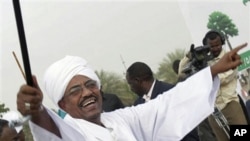Sudanese President Omar al-Bashir did not appear at independence day celebrations in the Central African Republic, where he faced the possibility of arrest and transfer to the International Criminal Court. Amnesty International says it is only a matter of time before he is brought to justice.
Sudanese President Omar al-Bashir is wanted by the International Criminal Court on charges of genocide, crimes against humanity and war crimes for his role in the conflict in Darfur.
Central African Republic invited the Sudanese president to attend a ceremony Wednesday in its capital, Bangui, to commemorate its 50th anniversary of independence.
No official reason was offered for Mr. Bashir's absence, but sources said mounting international pressure for his arrest played a role.
The International Criminal Court had called on the Central African Republic to arrest Mr. Bashir, if he showed up, and transfer him to the court. International human rights groups, like Human Rights Watch and Amnesty International, had criticized CAR's invitation to Mr. Bashir and urged the country to deliver him to justice.
Amnesty International's senior legal advisor, Christopher Keith Hall, says it is only a matter of time.
"These are crimes which have no statute of limitations," Hall said. "Once the arrest warrant has been issued, that will be there for as long as it takes for justice to be done."
Since the International Criminal Court issued the arrest warrants for Mr. Bashir in March 2009 and July 2010, he has refused to surrender to the court and has traveled on the continent without arrest.
Amnesty International said Central African Republic had an obligation to arrest Mr. Bashir under the Rome Statute of the International Criminal Court, which it ratified in November 2006.
The government of Kenya, also a signatory of the Rome Statute, had refused to arrest the Sudanese president earlier this year when he visited.
Amnesty legal advisor, Christopher Hall, said countries should not protect Mr. Bashir.
"It would send exactly the same sort of message that the international community has been sending since Nuremberg, and that is if you commit a crime against humanity or a war crime or genocide, no matter what your rank, you will eventually face justice," Hall said. "This is exactly what happened to President Milosevic and President Charles Taylor, both of whom thought they had complete impunity from arrest. They both found out to their sorrow that justice caught up with them."
The independence day celebration in CAR was Mr. Bashir's second missed appearance this week. He was supposed to attend a European Union-Africa Union summit in Libya earlier this week.
Amnesty International says since the conflict in Darfur started in 2003, more than 300,000 people have been killed, thousands raped, and millions forcibly displaced.











